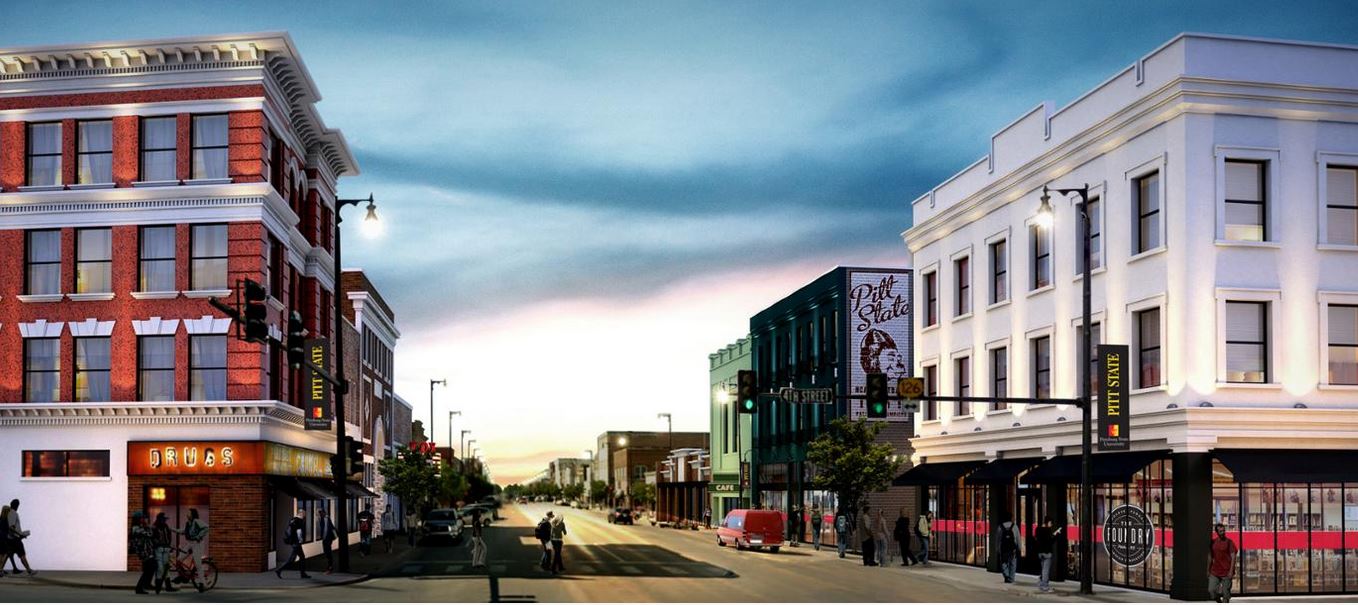
Block22 in Pittsburg | Download this photo.
Kansas Profile – Now That’s Rural: Heather Horton, Block22
May 22, 2019
Block22. That sounds like part of a play call in football. In this case, Block22 is the name of a redevelopment project which is helping transform a historic downtown in a key southeast Kansas community.
Heather Horton is an entrepreneur and owner of a small business located near the district known as Block22 in Pittsburg, Kansas. Heather grew up in the nearby rural community of Girard, population 2,789 people. Now, that’s rural.
In Girard, her high school sweetheart was Roger Horton whom she would later marry. Heather earned a bachelor’s degree in commercial art and a master’s degree in communications from Pittsburg State, while Roger studied at Fort Scott Community College.
“We would walk around downtown and enjoyed looking at the old buildings,” Heather said. However, as in many communities, the downtown area was suffering. In 2006, Heather co-founded the Pittsburg ArtWalk, a semiannual event which showcases local artists, musicians and more in downtown Pittsburg.
One downtown landmark, the historic Colonial Fox Theatre, was decaying and was likely headed for demolition in 2007. Local citizens, including Heather Horton and many others, rallied to save the old structure. The Colonial Fox Theatre Foundation, of which Heather was a founding member, was formed and is remodeling the building.
In 2017, a partnership developed between the city of Pittsburg, Pittsburg State University, and a private investor named the Vecino Group. The goal was to further improve the downtown while adding student housing. Together, these organizations created this remarkable project known as Block22.
Block22 takes its name from the city’s founding. According to the Pittsburg State website, the city’s forefathers originally platted Pittsburg into 51 blocks. Block number 22 included a historic opera house which is located in the area that was redeveloped.
Block22 now refers to the four historic buildings which are a part of this $18 million redevelopment project. These buildings now offer nearly 100 student residential units for Pittsburg State students, plus more than 16,000 square feet of innovation space. A shuttle service operates between downtown and the Pittsburg State campus.
“I think Block22 is going to be transformational for the community,” said Marty Beezley, chair of Pittsburg’s Economic Development Advisory Committee, as shown in a Pittsburg State video. The area is described as “a unique, mix-use, living-learning community in Downtown Pittsburg that features residential, commercial, dining, and entertainment spaces.”
“Our goal is to create a living, learning community that is an anchor for the growth that’s going to occur throughout this entire city, not just downtown,” said Dr. Shawn Nacarotto, chief strategic officer at Pittsburg State.
“The downtown is your heart,” Heather Horton said. “If your heart is not pumping correctly, the rest of your body is not going to function.” After graduation from Pittsburg State, Heather opened her own business downtown where she and Roger now live.
“When we decided to purchase our building in 2007, the heart of Pittsburg, downtown, was bare,” Heather said. “Fast forward 12 years and it's more vibrant than ever, with tons of boutiques, two coffee shops, a bright night life and fun festivals. To see the hustle and bustle happening, people in this area walking around, watching the progress go on, that’s pretty cool.”
In 2017, Heather and Roger were recognized with the President’s Award from the Pittsburg Area Young Professionals. That same year the Pittsburg Area Chamber of Commerce honored Heather as a Woman of Distinction for her work to preserve the arts as well as being a successful small business owner, and in 2018, named her business its Small Business of the Year.
For more information about the downtown district, see www.block22psu.com.
Block22. It’s not a football play, but a remarkable downtown redevelopment project in Pittsburg. We salute Heather and Roger Horton, Marty Beezley, Shawn Nacarotto, and all those who support this project for making a difference with an innovative approach to providing student housing and rebuilding downtown. They are part of the building blocks for their community.
And there’s more. What is Heather’s business? We’ll learn about that next week.
Audio and text files of Kansas Profiles are available at http://www.kansasprofile.com. For more information about the Huck Boyd Institute, interested persons can visit http://www.huckboydinstitute.org.
----------------
The mission of the Huck Boyd National Institute for Rural Development is to enhance rural development by helping rural people help themselves. The Kansas Profile radio series and columns are produced with assistance from the K-State Research and Extension Department of Communications News Media Services unit. A photo of Ron Wilson is available at http://www.ksre.ksu.edu/news/sty/RonWilson.htm.

